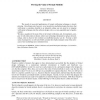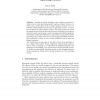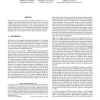ASE
2008
14 years 17 days ago
2008
Model checkers were originally developed to support the formal verification of high-level design models of distributed system designs. Over the years, they have become unmatched in...
ECCB
2008
IEEE
14 years 18 days ago
2008
IEEE
Abstract: Models of the dynamics of cellular interaction networks have become increasingly larger in recent years. Formal verification based on model checking provides a powerful t...
CAV
2010
Springer
14 years 19 days ago
2010
Springer
ABC is a public-domain system for logic synthesis and formal verification of binary logic circuits appearing in synchronous hardware designs. ABC combines scalable logic transforma...
FORTE
1994
14 years 1 months ago
1994
The record of successful applications of formal verification techniques is slowly growing. Our ultimate aim, however, is not to perform small pilot projects that show that verific...
PDSE
1998
14 years 1 months ago
1998
The development of correct OO distributed software is a daunting task as soon as the distributed interactions are not trivial. This is due to the inherent complexity of distribute...
ISICT
2003
14 years 1 months ago
2003
: Cryptographic protocols are used to achieve secure communication over insecure networks. Weaknesses in such protocols are hard to identify, as they can be the result of subtle de...
ISICT
2003
14 years 1 months ago
2003
: Formal verification provides a rigid and thorough means of evaluating the correctness of cryptographic protocols so that even subtle defects can be identified. As the application...
ISARCS
2010
14 years 2 months ago
2010
Methods of formal description and verification represent a viable way for achieving fundamentally bug-free software. However, in reality only a small subset of the existing operati...
TPHOL
2000
IEEE
14 years 4 months ago
2000
IEEE
The IA-64 architecture defers floating point and integer division to software. To ensure correctness and maximum efficiency, Intel provides a number of recommended algorithms which...
DAC
1997
ACM
14 years 4 months ago
1997
ACM
We present our experiences with the formal verification of an automotive chip used to control the safety features in a car. We used a BDD based model checker in our work. We descr...



